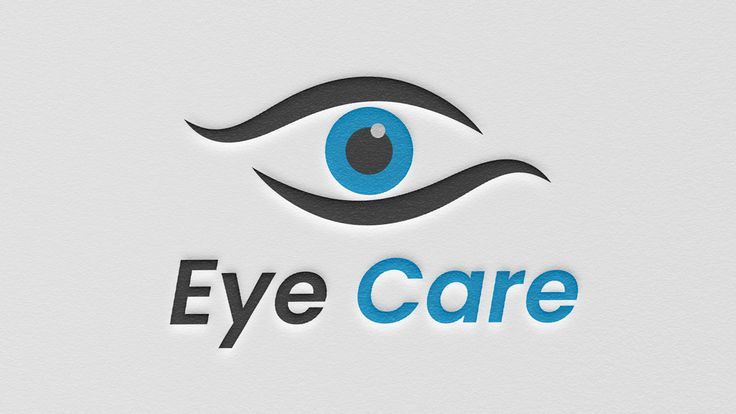Glaucoma Treatment in Zaheerabad
Home/Services/Cataract Surgery
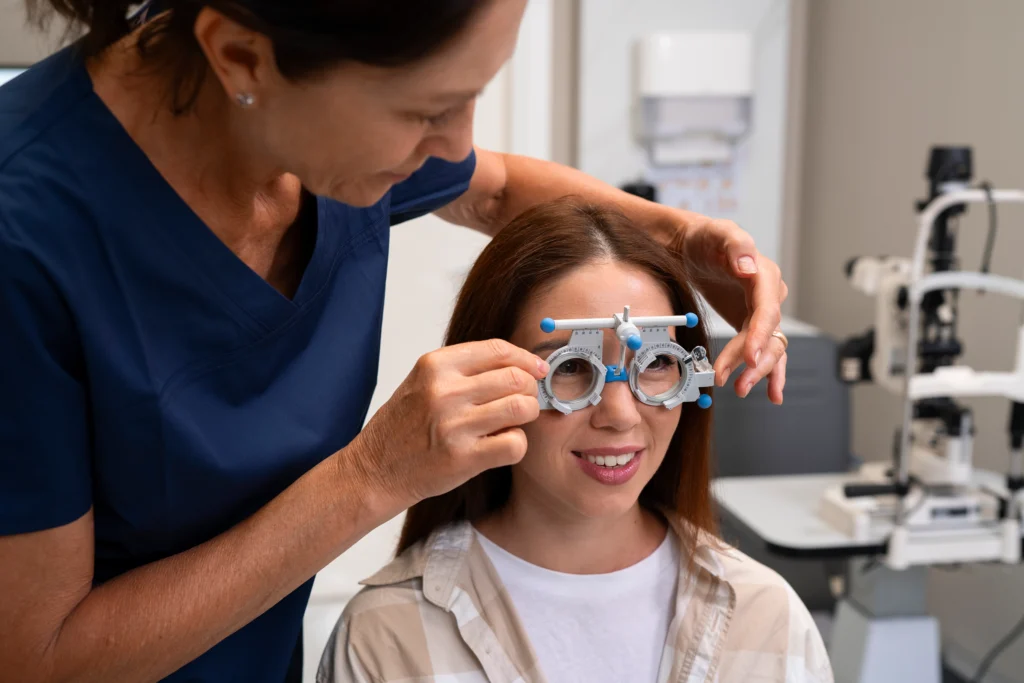
WHAT IS Glaucoma?
Understanding About Glaucoma
Glaucoma is a group of eye conditions that damage the optic nerve, which is crucial for good vision. This damage is often caused by abnormally high pressure in the eye, known as intraocular pressure. Glaucoma is one of the leading causes of blindness for people over the age of 60, but it can affect people of all ages.
There are several types of glaucoma, with the most common being open-angle and angle-closure glaucoma. Open-angle glaucoma develops slowly over time and often has no symptoms until significant vision loss occurs. Angle-closure glaucoma can occur suddenly and is considered a medical emergency.
Symptoms may include severe eye pain, nausea, blurred vision, and seeing halos around lights. Early detection and treatment are crucial in managing glaucoma and preventing irreversible vision loss. Regular eye exams are essential for detecting glaucoma in its early stages.
Symptoms of Glaucoma Include
- Blurred Vision
- Tunnel Vision
- Eye Pain
- Headaches
- Nausea and Vomiting
- Red Eyes
- Halos Around Lights
- Eye Pressure
- Vision Loss
- Hazy or Cloudy Vision
When to consider Glaucoma surgery
Patients with advanced glaucoma, where vision loss is imminent, are prime candidates for surgical intervention. Surgery aims to lower IOP and reduce the risk of vision loss. Types of glaucoma surgeries include trabeculectomy, glaucoma drainage implants, and minimally invasive glaucoma surgeries (MIGS). Each procedure has its own set of benefits and risks, so it is crucial for patients to consult with their ophthalmologist to determine the best surgical option for their specific condition and needs.
1.Regular Eye Exams: Frequent eye check-ups are essential, especially if you’re over 40 or have a family history of glaucoma. Early detection can significantly slow down its progression.
2.Follow Medication Regimen: If prescribed eye drops or other medications, use them as directed to help maintain optimal eye pressure.
3.Protect Your Eyes: Wear protective eyewear when engaging in activities that could cause eye injuries, which can exacerbate glaucoma.
Different Types of Glaucoma
Primary open-angle glaucoma (POAG)
The most common type in the United States, POAG is caused by the eye’s drainage channels becoming clogged over time. It usually develops slowly and causes painless damage to the optic nerve.
Angle-closure glaucoma
Also called narrow-angle or acute glaucoma, this is a medical emergency that occurs when the eye’s drainage suddenly becomes blocked. Symptoms include severe eye pain, redness, headaches, blurry vision, halos around lights, dilated pupils, nausea, and vomiting.
Congenital glaucoma
A rare type that occurs in very young children, congenital glaucoma is caused by an abnormality in the eye that prevents fluid from draining normally. Babies with congenital glaucoma may have enlarged eyeballs, called buphthalmos, due to the extra fluid stretching their eyes.
IridoCorneal Endothelial (ICE) syndrome
A very rare form of glaucoma that typically affects one eye. It occurs when the endothelial layer of the cornea grows over the trabecular meshwork and iris, causing an increase in intraocular pressure and optic nerve damage.
Secondary glaucoma
Caused by an underlying eye condition, such as inflammation of the eye (uveitis).
FAQs
What is glaucoma, and how does it affect vision?
Glaucoma is a group of eye diseases that damage the optic nerve, usually due to increased pressure inside the eye. This damage can lead to progressive vision loss and, if left untreated, can result in blindness.
Who is at risk for developing glaucoma?
Several factors can increase the risk of developing glaucoma, including age (people over 60 are at higher risk), family history of the disease, high intraocular pressure, certain medical conditions (such as diabetes, hypertension, and heart disease), prolonged use of corticosteroid medications, and severe eye injuries.
Can glaucoma be prevented or cured?
While there is currently no cure for glaucoma, early detection and treatment can help prevent or slow the progression of the disease and preserve vision. Preventive measures include regular comprehensive eye exams, especially for those at higher risk, maintaining a healthy lifestyle, managing medical conditions like diabetes and high blood pressure, and following prescribed treatments to reduce intraocular pressure.
Our Services
Book An Appointment
Why Choose Eyecare Optical and Clinic ?
- Experienced Doctors
- Cutting-edge Technology
- 1000+ Trusted Patients
- 10+ Years Services
- 10,000+ Surgeries
- 100% Accurate Results
- Quick Recovery
- Your Vision Is Our Focus
- Treatments

Customised LASIK
Personalized LASIK is a type of vision correction surgery that is more accurate and specific than normal LASIK since it is customized to the specific flaws in each patient's eye.

Retina Services
Retinal services include specialist medical care for the diagnosis, treatment, and management of disorders and diseases that impact the retina.
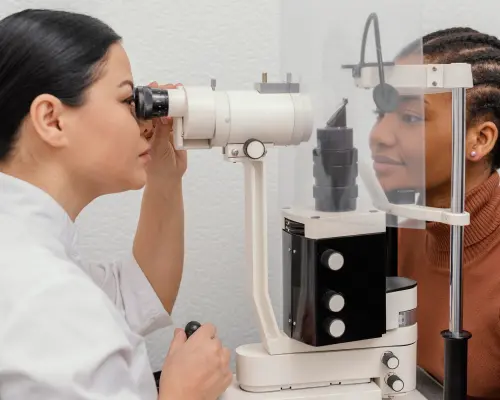
Corneal Services
The clear front surface of the eye, the cornea, is affected by a variety of diseases and ailments, which Corneal Services specializes in identifying, treating, and managing.

Anti-VEGF Agents
Anti-VEGF therapies are drugs that prevent aberrant blood vessel formation and leakage by blocking vascular endothelial growth factor (VEGF).
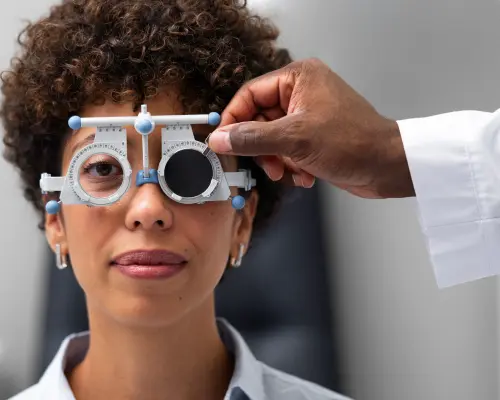
Epi-LASIK
A form of refractive surgery called epi-LASIK uses a laser to separate and reshape the corneal epithelium in order to treat visual issues like astigmatism, hyperopia, & myopia.

Dry Eye Treatment
To control symptoms and enhance tear production, dry eye treatment options include prescription drugs like cyclosporine, artificial tears, and lifestyle modifications.
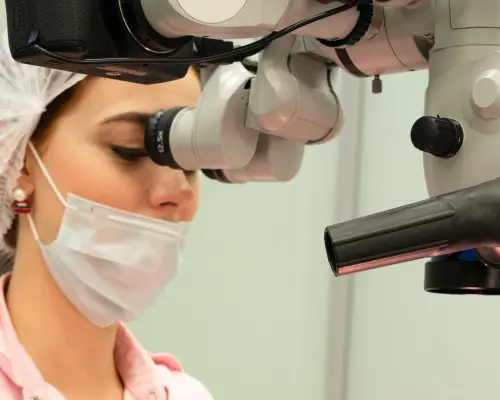
Contoura Vision
Contoura visual is a highly precise LASIK eye surgery treatment that corrects visual abnormalities using topography-guided technology.

ICL
The term "ICL" refers to Implantable Collamer Lenses, a kind of corrective lens that is placed inside the eye to cure astigmatism, hyperopia, and myopia.
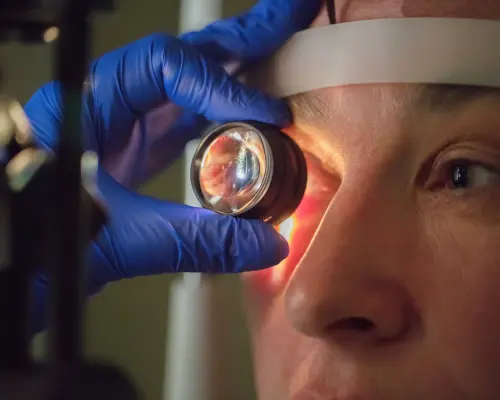
Cataract Surgery
The process of having a cataract surgically removed and a clean artificial lens placed in its place restores eyesight.

